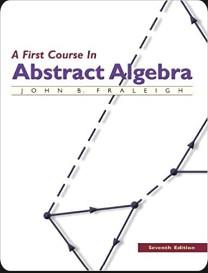Give a one- or two-sentence synopsis of if' part of Theorem 27.9. Data from Theorem 27.9 Let
Question:
Give a one- or two-sentence synopsis of "if' part of Theorem 27.9.
Data from Theorem 27.9
Let R be a commutative ring with unity. Then M is a maximal ideal of R if and only if R/M is a field.
Proof Suppose M is a maximal ideal in R. Observe that if R is a commutative ring with unity, then R/M is also a nonzero commutative ring with unity if M ≠ R, which is the case if M is maximal. Let (a+ M) ∈ R/M, with a ∉ M, so that a+ M is not the additive identity element of R/M. Suppose a + M has no multiplicative inverse in R/ M. Then the set (R/ M)(a + M) = {(r + M)(a + M) I (r + M) ER/ M} does not contain 1 + M. We easily see that (R/M)(a + M) is an ideal of R/ M. It is nontrivial because a ∈ M, and it is a proper ideal because it does not contain 1 + M. By the final paragraph of Section 26, if γ : R → R/M is the canonical homomorphism, then γ-1 [(R/M)(a + M)] is a proper ideal of R properly containing M. But this contradicts our assumption that M is a maximal ideal, so a + M must have a multiplicative inverse in R/M.
Conversely, suppose that R / M is a field. By the final paragraph of Section 26, if N is any ideal of R such that M ⊂ N ⊂ R and γ is the canonical homomorphism of R onto R/M, then γ[N] is an ideal of R/M with {(0 + M)} ⊂ γ[N] ⊂ R/M. But this is contrary to Corollary 27.6, which states that the field R/M contains no proper nontrivial ideals. Hence if R/M is a field, M is maximal.
Step by Step Answer:






